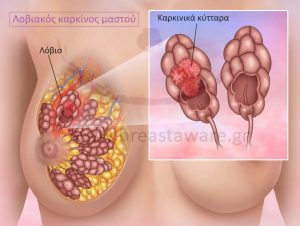
Histological Types of Breast Cancer
Breast cancer it is not a single disease, but includes various histological types, which differ in frequency, behavior, diagnosis and treatment. The classification is based on the point from which the cancer begins and the characteristics of the cancer cells.
Ductal and Lobular Breast Cancer
- Ductal breast cancer: It is the most common histological type, as it affects approximately 80% of cases, It starts from the milk ducts, namely the tubes that carry milk to the nipple.
- Lobular breast cancer: Corresponds approximately to 10% of cases and rushes out of the lobes, the glandular formations that produce milk.

In Situ and Invasive Cancer
Histological types are further divided into:
- In situ (non-invasive): Cancer cells are confined within the ducts or lobules and they have not filtered the surrounding tissue.
- The ductal carcinoma in situ (DCIS) has a very good prognosis when treated early.
- The lobular carcinoma in situ (LCIS) is not considered a true malignancy but increased factor danger for developing cancer in the future.
- Invasive cancers: Have spread into the surrounding tissue and may metastasize.
Main Histological Types of Invasive Breast Cancer
Invasive Ductal Carcinoma (IDC)
The most common type of invasive cancer, constitutes the 80% of all cases. It starts from the milk ducts and has a varied clinical expression.
Treatment: It includes surgical removal by lumpectomy or mastectomy, depending on the size and location of the lesion. The treatment is complemented by radiation therapy, chemotherapy, hormone therapy, or targeted therapy, depending on the biological characteristics of the tumor.
Invasive Lobular Carcinoma (ILC)
It represents approximately 10% of invasive cancers. It emerges from the lobes and is characterized by discreet or diffuse infiltration, which makes it indistinguishable in the image.
Special features:
- Often underestimated in extent.
- Έχει increased likelihood of appearing in both breasts.
- Treatment options are similar to ductal carcinoma.
Rare Histological Types of Breast Cancer
Medullary Carcinoma
Corresponds to 3-5% of cases and is common in carriers of BRCA1 mutation. It is triple negative (ER-/PR-/HER2-) but shows good response to chemotherapy and less chance of lymph node metastases.
Mucinous (Colloid) Carcinoma
Answered to 2% of cases and is characterized by presence of mucus around the cancer cells. It is usually HER2- and has a relatively good prognosis.
Tubular Carcinoma
A rare type (2%) which appears mainly in postmenopausal womens. It is considered less aggressive and is associated with very good prognosis.
Papillary Carcinoma
Extremely rare (<1%) and usually appears in elderly women. It often coexists with ductal carcinoma in situ.
Why Is Knowing the Histological Type Important?
Identifying the histological type of breast cancer helps guide the appropriate treatment and predict the disease course. Personalized treatment approaches are based on histological, molecular, and genetic features..
Scientific Sources:
- WHO Classification of Tumours Editorial Board. Breast Tumours (WHO Classification of Tumours, 5th Edition). IARC, 2019.
- National Cancer Institute. Ductal and Lobular Breast Cancer.
- American Cancer Society. Breast Cancer Facts & Figures 2022-2024.
Learn more at BreastAware.gr
At BreastAware.gr You will find scientifically supported information about breast cancer, breast diseases, diagnostic tests, and proper prevention. Our goal is to empower women through education and understanding of their health.
